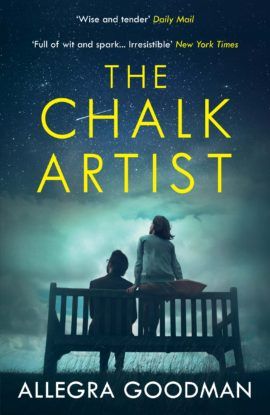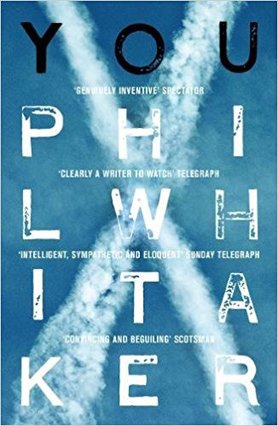The Chalk Artist by Allegra Goodman
Can these characters escape the alternate reality, or will it consume them all?
The Chalk Artist is an engaging story of addiction, love and loyalty, although perhaps a challenging one for those with teenagers suspected of selling their souls to games. I found it a poignant tale of young people learning to judge for themselves what they’re good at and thereby finding their place in the world.
One of the author’s previous novels, Intuition, about overly zealous academics in a research lab, made my post on fictional research, suggesting (yes, from a sample of two) over-involvement is one of Allegra Goodman’s themes. The Chalk Artist has the added bonus of a fictional school psychologist, albeit for only a few lines. Thanks to British publisher Atlantic Books for my review copy.
You by Phil Whitaker
Stevie Buchanan is taking the train to Oxford in the hope of seeing his twenty-one-year-old daughter who’s studying there. The meeting seems unlikely: she’s ignored all his communications for the last seven years. On the way, he muses on how this has come about, as well as reflecting on the support group he attended and the different outcomes for the mothers and fathers involved.
In reviewing the past, Stevie leaves his present-day body to swoop across the English countryside, his daughter flying behind or alongside him until they descend to earth as spectres to view the events that have shaped the family system across generations. I do hope other readers appreciate this whimsy; I’d have been happier without it.
Stevie formulates his predicament convincingly in terms of his former partner’s addiction to victimhood, rooted in her own mother’s indifference to her as a child. Much as I relished the acknowledgement of attachment issues and their impact on parenting, I’m afraid I found this rather preachy, and his minimisation of the potential contribution of his own pathology (as a compulsive rescuer) to the collapse of the family rather irritating. (His own sense of victimhood, however legitimate, was pressed on the reader so strongly – and on the daughter-in-his-head to whom the you of the title is addressed – I expected there to be some kind of reversal, showing Stevie was not as innocent as he’d have us believe.)
I also found it odd that Stevie should attribute all the theory of attachment, psychological defences, and the triangular space of victim, perpetrator and rescuer to the academic psychologist in his support group rather than his own discipline of art therapy. (But the acknowledgements testify that he’s checked this out with a couple of practitioners and I might be biased through my experience of working alongside art therapists with a psychodynamic orientation.) I also wondered about his pressing a client in the medium-secure unit where he works to tell how it feels when, to my mind, the strength of art therapy is in its communication beyond words.
Nevertheless, with the profession underrepresented in my collection of fictional psychologists and psychotherapists (one being Liesel in my own novel, Underneath; the other actually identified as a clinical psychologist; both, incidentally, like Stevie, employed in secure mental health services), it was heartening to discover another fictional art therapist.
You is a psychologically ambitious novel about the damage wrought by poor parenting which, despite my appreciation of the author’s last book, I found insufficiently subtle. Thanks to Salt for my review copy.
My short story “As Smell of Paint” which will appear in my forthcoming anthology, also features a mother who has turned her daughter against her father following an acrimonious divorce. For another novel where the responsibility is shared equally between the estranged parents, see One of the Boys. For a couple of other novels that articulate attachment theory without bludgeoning the reader, see my reviews of The Course of Love and The Gustave Sonata.
| Over on the Carrot Ranch, Charli Mills is getting excited about the colourful signs of spring. But, as a few months back when we wrote about edges, she’s concerned, like a child with a colouring book, about going over the lines. While this week’s 99-word story prompt (click on tap on the image for more information) immediately (or soon after my usual initial hesitation protesting I can’t do that) made me think of the artists in these novels, I’ve chosen to write about another kind of line. |
She used to think it was a lion circling the earth. But, older now, she saw how dumb that was: not even an imaginary lion could walk on water. No, it was a line, as she wrote in her essay, anticipating a shiny gold star. And everyone standing on that line – Brazilians, Kenyans, Congolese – would be equal. That’s what equator meant. No billionaires guzzling caviar while others starved. When she grew up she’d join them. Or maybe not. Maybe she’d find a way to thicken the line to a band and stretch it from the Arctic to Cape Horn.
























 RSS Feed
RSS Feed





















